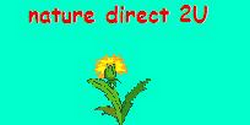Copy of `Nature Direct 2U - Medical Terms`
The wordlist doesn't exist anymore, or, the website doesn't exist anymore. On this page you can find a copy of the original information. The information may have been taken offline because it is outdated.
|
|
|
Nature Direct 2U - Medical Terms
Category: Health and Medicine > Medical Terms
Date & country: 08/01/2008, UK
Words: 241
|
AbortifacientInduces the premature expulsion (abortion) of a foetus. Same meaning as Ecbolic, e.g. pennyroyal.
AdaptogenicHelping the human organism adapt to stressful conditions.
AerophagyAn excess of air in the alimentary canal that is relieved through burping or flatulence.
AgueAn intermittent fever, sometimes with chills, as in malaria.
AlkaloidA large, varied group of complex nitrogen-containing compounds, usually alkaline, that react with acids to form soluble salts, many of which have physiological effects on humans. Includes nicotine, cocaine, caffeine, etc.
AlterativeA medicinal substance that gradually restores health and the nutritional state of the body.
AmenorrheaAbsence or suppression of menstruation.
AnaestheticNumbs the nerves and causes loss of sensation.
AnalgesicA medicine which relieves or reduces pain.
AnaphrodisiacReduces sexual desire.
AnhydroticStops sweating.
AnodyneA pain-relieving medicine, milder than analgesic.
AntacidNeutralizes the acid produced by the stomach. Do the self-test to see if excessive acid is the cause of indigestion.
AnthelminticAn agent that kills, destroys and expels worms from the intestines. Same as vermifuge.
Anti-aphrodisiacSuppressing sexual desire.
Anti-convulsantReducing or relieving convulsions or cramps.
Anti-emeticPrevents, counteracts or alleviates nausea and vomiting.
Anti-epilepticAn agent that combats the convulsions or seizures of epilepsy.
Anti-inflammatoryReducing or neutralizing inflammation.
Anti-lithicAids in preventing the formation of stones or calculus in the kidneys and bladder.
Anti-oxidantPreventing oxidation; a preservative.
Anti-periodicPrevents the periodic recurrence of attacks of a disease; as in malaria.
Anti-rheumaticAn agent that relieves or cures rheumatism.
Anti-syphiliticHerbs that improve or cure syphilis. Also called antileutic.
AntibacterialDestroys or stops the growth of bacteria.
AntibiliousAn herb that combats biliousness. The term biliousness refers to a group of symptoms consisting of nausea, abdominal discomfort, headache, constipation, and gas that is caused by an excessive secretion of bile.
AntibioticAn agent that inhibits the growth or multiplication of, or kills, a living organism; usually used in reference to bacteria or other microorganisms.
AntidepressantReduces or prevents depression.
AntidiarrhoeicRelieves diarrhea.
AntidoteCounteracts a poison.
AntifungalAn agent that inhibits the growth or multiplication of fungi, or kills them outright.
AntigalactagoguePrevents or decreases the production of milk secretion of nursing mothers.
AntihistaminicNeutralizing the effect or inhibiting production of histamine.
AntimicrobialAn agent that inhibits the growth or multiplication of microorganisms, or kills them.
AntineuralgicStops nerve pain.
AntiparasiticalDestructive to parasites.
AntiphlogisticAn agent that counteracts, reduces or prevents inflammation.
AntipruriticRelieves or prevents itching.
AntiputridStops putrefaction.
AntipyreticReduces fever. Same as febrifuge or refrigerant.
AntiscleroticRemoves deposits from circulatory vessels.
AntiscorbuticAn agent effective in preventing scurvy.
AntisepticPreventing sepsis, decay, putrefaction; also, an agent that inhibits the growth of, and kills, germs, bacteria & microbes.
AntispasmodicRelieves or prevents spasms, cramps, and convulsions.
AntisudorificReduces perspiration.
AntitoxicCounteracts poisons.
AntitumorPreventing or effective against tumors or cancers.
AntitussivePreventing or relieving cough.
AntivenomousActs against poisonous matter from animals and snakes.
AntiviralAn agent that inhibits growth or multiplication of viruses, or kills them.
AntizymoticHerbs that can destroy disease-producing organisms.
AperientA gentle purgative of the bowels.
AperitifAppetite stimulant.
AphasiaInability to express oneself properly through speech or loss of verbal comprehension; sensory and motor areas may be involved.
AphrodisiacIncreasing or exciting sexual desire.
ApoplexyThe result of a stroke (cerbrovascular accident (CVA)).
AromaticAgents which emit a fragrant smell and produce a pungent taste. Used chiefly to make other medicines more palatable.
AscarisRoundworm (also called maw-worm and eelworm) found in the small intestine causing colicky pains and diarrhea, especially in children.
AscitesExcessive accumulation of serous fluid in the peritoneal (abdominal) cavity.
AstheniaLack or loss of strength, usually involving muscular system.
AstringentAn agent that causes tissue to contract.
BactericidalAn agent that kills bacteria.
BalsamThe resin of a tree that is healing and soothing, e.g. myrrh.
BalsamicSoftens phlegm.
Bitter tonicBitter-tasting properties which stimulate the flow of saliva and gastric juice. Used to increase the appetite and aid in the process of digestion.
BolusA suppository injected into the rectum or vagina.
BronchodilatorExpands the spastic bronchial tube.
CalmativeAn agent with mild sedative, tranquilising or calming effects.
CardiacStimulates or affects the heart.
CardioactiveAffecting the heart.
CardiotonicTones the heart muscle.
CarminativeAn agent that relieves and removes gas from the digestive system.
CataplasmAnother name for poultice.
CatarrhAn inflammation of the mucous membranes with a free discharge. This has special reference to the air passages of the head and throat, e.g. hayfever, rhinitis, influenza, bronchitis, pharyngitis, asthma.
CatharticA powerful purgative or laxative, causing severe evacuation, with or without pain.
CephalicReferring to diseases affecting the head and upper part of the body.
CholagogueAn agent that increases bile flow to the intestines.
CholereticStimulates the production of bile.
ChoreaNervous disorder marked by muscular twitching of arms, legs and face.
CicatrisantHelps the formation of scar tissue; healing.
CNSCentral nervous system.
CoagulantClots the blood.
CondimentEnhances the flavour of food.
CordialA stimulating medicine or drink.
CounterirritantAn agent that produces inflammation or irritation when applied locally to affect another, usually irritated surface to stimulate circulation, e.g. a mustard plaster or liniment.
CystitisInflammation of the urinary bladder.
CytophylacticProtects the cells of the organism.
CytotoxicAn agent that is toxic to certain organs, tissues, or cells.
DecoctionA preparation made by boiling a plant part in water. Compare with Infusion.
DecongestantRelieves congestion.
DemulcentAn agent that soothes and softens irritated tissue, particularly mucous membranes.
Demulcent febrifugeReduces heat while building bodily fluids.
DeobstruentRemoves obstructions by opening natural passages or pores of the body.
DepurativeTends to purify and cleanse the blood and internal organs. Same as blood purifier.
DermatomycosesSkin infection caused by fungi.
DetergentAn agent that cleanses boils, sores, wounds etc.
DetersiveDetergent. Cleanses wounds and sores, and promotes the formation of scar tissue.
DetoxicantRemoves toxins.
DiaphoreticAn agent that induces sweating or perspiration.
DigestantContains substances (i.e. ferments, acids) which aid in digestion.

